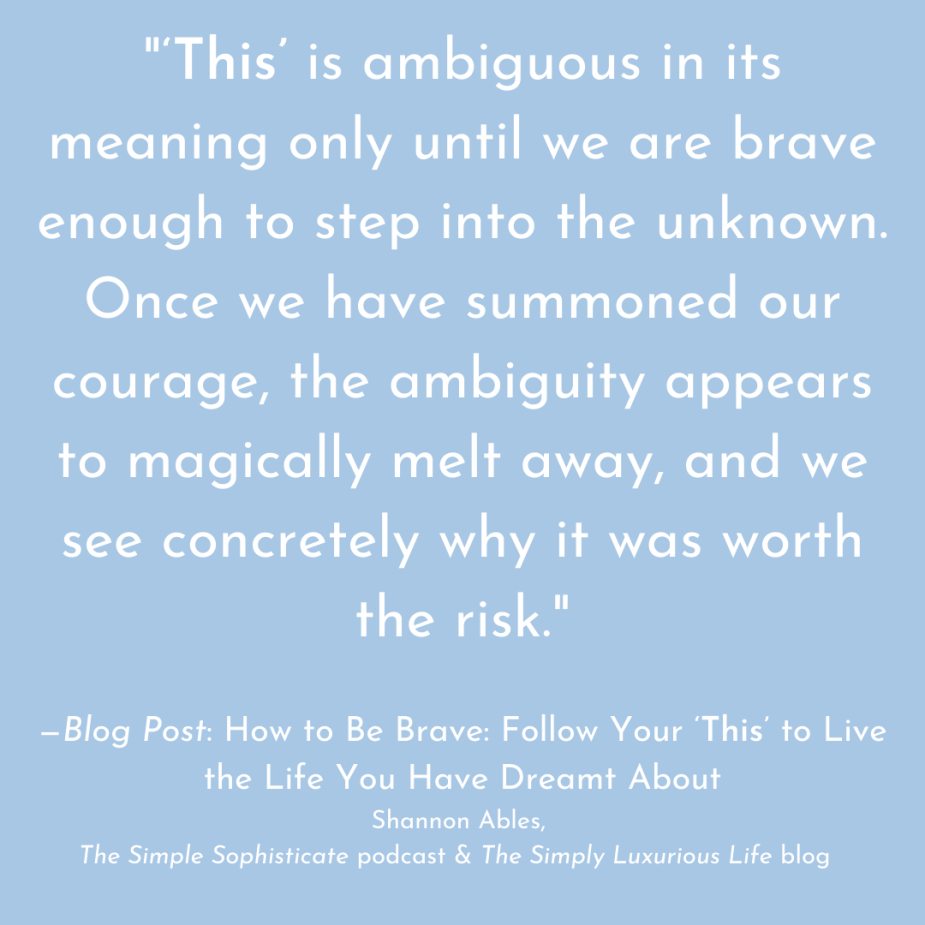Become a Member for as little as $4/mo and enjoy unlimited reading of TSLL blog.
For now twenty years I have been teaching English composition and literature and specifically rhetoric for 10 of the 20. As was taught to me by a professor of rhetorical far wiser than I, my students regularly hear me or see written on their essays a comment striking out pronouns, and quite frequently the demonstrative pronoun ‘this’. Not able to exist without an antecedent, a noun or noun phrase to which it refers, I challenge my students to be concise, clear and specific. Eliminate ambiguity and therefore eliminate the ‘this’ because unless it is used for rhetorical purposes it is empty, taking up space, void of valuable, insightful, new meaning, but …
… sometimes, it is the ambiguity in our lives which holds the answers. The most awesome answers which lead to living with true contentment. However, the answers only reveal themselves if we seek behind what the ‘this’ beholds.
‘This’ is your curiosity speaking, encouraging, softly inviting you to see what the puzzle of your life wants to reveal, the treasure map of your life as I prefer to call it.
‘This’ is your unique journey waiting beyond its unlocked door as you are the key if only you will nudge it open and take the first step over the threshold. ‘This’ could be prompted by something as unexpected as a pandemic which required teachers and students to teach and learn from home, families to evaluate the pace of their lives, each of us to contemplate the space necessary to live as well and more deeply, what living well entails, and all of us to value our health and well-being more deeply than many may have ever done before.
For so many of us this moment in history is ironically bringing to light in the darkest of times in history discoveries we may have skipped over, ignored, or dismissed regarding what is most deeply needed to experience fulfilling individual lasting contentment.
‘This’ is ambiguous in its meaning only until we are brave enough to step into the unknown. Once we have summoned our courage, the ambiguity appears to magically melt away, and we see concretely why it was worth the risk. Because as Margie Warrell shares, “Courage is the price that life exacts for living a life that inspires you.” Turn ‘this’ life-up-ending moment in history into a life changer for the better. Let your ‘this’ turn your dreams into a reality you have longed to experience each and every day: a life as a full-time writer, a career as a successful business owner, a dedicated parent, a fully content human, a full, secure, loving human being in an relationship with another secure, loving, secure human being.
“By their nature, dreams create a gap between your present reality and the reality you want to have, causing you to question whether you can bridge that gap. This risk alone can be so daunting for people that they prefer to leave their dreams in their childhood or buried away beneath layers of fear, doubt, and resignation. That’s why dreaming bigger dreams takes courage; it means risking the possibility that your dreams will not come true.” —Margie Warrell, author of Stop Playing Safe

‘This’ has the answers you seek, but you can’t peek over its shoulder to abscond with the answers without doing the tough, the hard, the dedicated work. You have to be brave. You have to commit.
SIMILAR POSTS YOU MIGHT ENJOY:

Why Not . . . Be Brave?, episode #83






Curious — can you please give an example where a student uses ‘this’ but it’s not necessary? Thanks!
Anytime it is not used for rhetorical purposes. Rhetoric is the art and craft of persuasion. Persuasion is the effective shifting or convincing of your audience about your opinion on a subject. “This demonstrates … “ is a common phrase unnecessary and without rhetorical intention. “This” shares no new information to build your credibility as the writer about your subject. Solution – swap the This for a different noun or noun phrase that further deepens the reader’s understanding about the antecedent. Second solution, vary your syntax (combine sentences, change the structure of the sentence, etc.).
The connections between becoming a stronger writer and a braver person leap off the page! I aspire to both.
What a beautiful perspective! Thank you so much for sharing. It resonates in a big way!
Thank you for stopping by Autumn. 🙂 Tickled to hear you enjoyed this week’s motivational post. Have a lovely week.
I was more interested in your “This” usage and couldn’t get past the first paragraph for awhile.lol. Interesting!
Maybe you can answer my question regarding American English? I often hear Americans say ‘off’ twice, as in ‘I got off off the bus” or are they saying offa, and I just can’t understand them ?
We would just say I got off the bus. Can’t understand why one would say it twice.
And ‘anyways’ – it that even a word? We would just say anyway.
Drives me insane when I’m listening to a podcast !!
I have no idea what they are trying to say. Definitely something colloquial based on where they are from. ? And you are correct, “anyways” is not a word as “anyway” is not a noun but an adverb and therefore cannot be pluralized. ? This is what M-W dictionary shares about its usage – Merriam-Webster identifies anyways as an archaic corruption of anywise, an expression meaning “in any way whatsoever.” In Old and Middle English, it was quite common to end adverbs in -s. We still have always and unawares. British English retains the -s in towards. So anyways isn’t too farfetched.
Thanks Shannon – I’ll try not to eye roll every time I hear ‘off off’ and ‘anyways’.
Love it how there is always an interesting tidbit on you blog. Gx
I think you’re reading them say “I got off of the bus” — what you’re hearing as a second “off” is probably “of.”
by “reading” I meant *hearing*